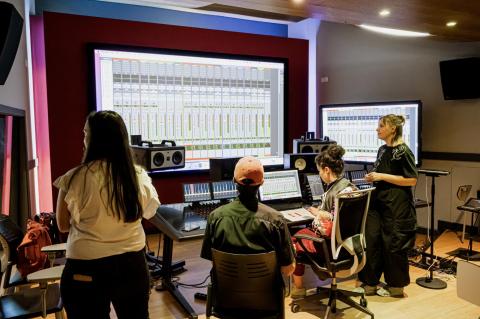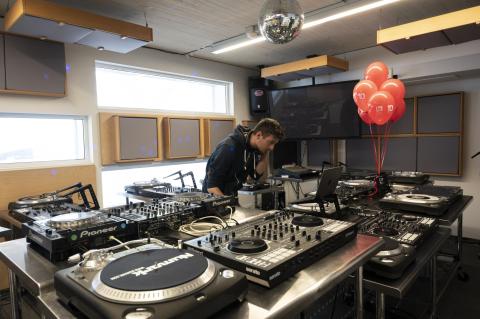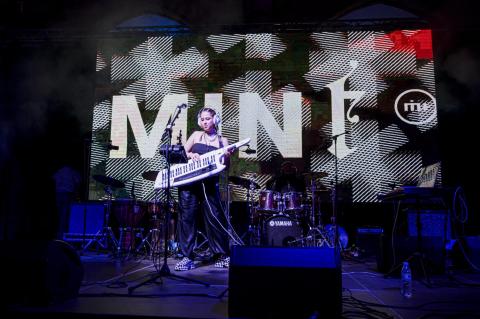The master in music production, technology, and innovation explores cutting-edge developments and forward thinking techniques in music and beyond. While strengthening sophisticated skills on the most current digital tools, students are challenged to disrupt the status quo while inventing the future of music.
Through accelerated study of hybrid recording, music video production, sound design, musical app development, electronic production and live performance, students develop in-demand skills to prepare themselves for careers as artists, technologists, producers, DJs, electronic composers, educators, and software and/or hardware designers.
Create the next generation of immersive and interactive music media

Choose from a variety of classes

Access state-of-the-art recording studios, equipment, and facilities

Develop a cutting-edge culminating experience project

You will apply the principles of innovation to your own advanced music project, which may be a technology-aided composition, a large-scale recording project, and/or live performances that may feature: interactivity; multi-channel audio; digital visual expressions; originally designed instruments and systems; and/or musical applications for web and mobile devices. Other innovations that push the boundaries of music and technology may also be possible for your project.
The goal is to produce a body of work that will prepare you for a career in music technology innovation, composition and production, interactive and mixed media, remixing, electronic musicianship, DJing, software and game development, live performance in solo and ensemble settings, and/or education. Upon completing the program, you will also be well prepared to adapt to rapid changes and new creative directions in the music industry.
Program Highlights

Advanced Studio Recording
Students spend ample time in our recording studios, mastering the most up-to-date techniques for capturing and manipulating sound. Students attain valuable skills in surround mixing, creating custom impulse responses, spectral repair, and complete control over pitch and time.

Digital Production and Design
Students get hands-on experience in music video production, sound design, synthesizer programming, and production using the latest hardware and software on the market (including Ableton Live, Max, ProTools, and Adobe Premiere). Students have access to our technology labs, recording studios, and scoring stage with the same hardware and software as any other top professional facility.

Live Performance
With the opportunity to collaborate with composition and performance master’s students on campus, music technology students push the limits of musical expression. Students explore the relationship between the musician and technology in live performance, with the goal of bringing something new and captivating to the audience.
Culminating Experience
This creative, practical, or research project will enable you to make a contribution to the music industry. Throughout the year, you will work on a project, in consultation with your faculty advisor and/or program director, which you will present at the end of the program. Professional-level work will be demanded of you. An examining committee made up of your advisor and one to two other faculty members will evaluate your work.
Graduation Requirements
On-campus graduate programs are designed to be completed in three semesters of full-time study or one full academic year—a consecutive fall, spring, and summer. The full-time summer term is six-to-seven weeks in length directly following the spring semester.
All students are expected to be in residence for the entire program (three academic terms). Furthermore, all candidates seeking to graduate must earn a minimum letter grade of B- in each course counting towards a degree requirement, attain a minimum GPA of 3.00, and complete all course work, the culminating experience, and other graduation requirements.
Program Details
What Will I Learn?
When you complete the Master of Music in Music Production, Technology and Innovation, you will have the ability to:
- create innovative music using technology;
- apply technology to the composition of music;
- analyze the properties of sound;
- master critical listening and assessment skills;
- synthesize studio technologies and techniques;
- master MIDI and audio production technologies and techniques;
- perform electronic music live;
- integrate music and audio into software applications and games;
- generate and manipulate video in relationship to music; and
- develop audio in the context of software applications (i.e., coding).
Entrance Requirements
We seek open-minded, ambitious musicians who want to leverage technology in pursuit of their artistic vision and career goals.
Ideal candidates want to:
- Gain cutting-edge skills in music technology;
- Apply new inspiration and possibilities to their artistic endeavors;
- Implement the principles of innovation to their craft and careers;
- Focus on developing and implementing new and emerging music technologies; and
- Shape the future of music.
Ideal candidates should demonstrate:
- Excellent musicality;
- Facility with technology;
- Success in both artistic and academic settings;
- A strong work ethic, including prior accomplishment; and
- The motivation to make massive progress in one year.
Curriculum and Courses
The master of music program at Berklee College of Music is designed to be completed in three semesters of study–or one full academic year: fall, spring, and summer semesters. There is an optional internship that takes place the fall after graduation for those who want to do an internship through Berklee for credit.
We will conduct placement exams in Engineering and in Ableton in order to place you in a section that best matches your level of experience to maximize the benefit you can get from these courses. In addition, we have two proficiencies that you must demonstrate before graduating from the program.
- Total Credits: 33/36 with optional internship
- Core Module
- Audio Engineering
- Studio Music Production
- Electronic Music Production & Performance
- Video Music Production
- Interactive Media
- Proficiencies
- Career Preparation
- Project Module
- Innovation Technology Seminar
- CE Advising
- Culminating Experience
- Elective Module
- Audio Engineering
- Studio Music Production
- Electronic Music Production & Performance
- Video Music Production
- Interactive Media
Each module, with course options, is described below.
Class Color Code
- Orange: Required Course
- Blue: Elective Course
- Green: Optional Course
Core Module
Audio Engineering
MTI-524 Master's Hybrid Recording Methods and Strategies
MTI-524, 3 credit(s), required course
This master's level audio recording engineering course will give students an overview of the methods and strategies that make up the professional practice of studio audio engineering, preparing them to apply these techniques to their music production work. This course explores the hybrid nature of modern recording techniques and strategies. The curriculum thoroughly studies the simultaneous integration of advanced large format consoles, cutting-edge digital audio workstation capabilities, as well as advanced, creative acoustic recording methods. The traditional console recording paradigm will be expanded by seamlessly merging it with powerful digital audio workstation signal processing using plug-ins. The course aims at innovating and streamlining the technological aspects of the recording process as a means to ultimately facilitate the creative endeavor of capturing music and emotion through sound.
MTI-525 Advanced Hybrid Recording Methods and Strategies
MTI-525, 3 credit(s), required course
This advanced, master's level audio recording engineering course will give students a comprehensive review of the methods and strategies that make up the professional practice of studio and post production audio engineering. This course explores the hybrid nature of modern recording techniques and stratagems. The curriculum thoroughly studies the simultaneous integration of advanced large-format consoles, cutting-edge digital audio workstation capabilities, as well as advanced creative acoustic recording methods. The traditional console recording paradigm will be expanded by seamlessly merging it with powerful digital audio workstation signal processing, plug-ins, customized signal flow architectures, and the ongoing research of alternative acoustic soundscapes. The course aims at innovating and streamlining the technological aspects of the recording process as a means to ultimately facilitate the creative endeavor of capturing music and emotion through sound.
Studio Music Production
MTI-531 Music Studio Production 1
MTI-531, 2 credit(s), required course
This course presents the techniques and standard practices of professional music production for the independent, freelance music producer. Students will learn to adapt these practices to the changing environment of modern music production, learning to develop a unique production style. The course will encourage students to develop working strategies from an awareness of their own skills and limitations to better understand and serve the needs of their artists and the needs of the changing music industry. Students will lead their own productions in the studios.
MTI-632 Music Studio Production 2
MTI-632, 2 credit(s), required course
A continuation of MTI-531, this course presents the techniques and standard practices of professional music production for the independent, freelance music producer. Students will learn to adapt these practices to the changing environment of modern music production, learning to develop a unique production style. The course will encourage students to develop working strategies from an awareness of their skills and limitations to better understand and serve the needs of their artists and the changing music industry. Students will lead their own productions in the studios and will include in-class production and evaluation by the faculty.
Electronic Music Production & Performance
MTI-523 Electronic Production and Live Performance
MTI-523, 3 credit(s), required course
This course explores topics in electronic production and live performance techniques related to modern electronic dance music production, sound design, arrangement, and performance. Students generate content and create their own music while learning how to use Ableton Live Suite. Students learn to analyze electronic music and explore techniques for remixing, performing, and creating electronic music.
Video Music Production
MTI-542 Live Video Music Production
MTI-542, 3 credit(s), required course
In this course, students explore a variety of multimedia software, hardware, tools and strategies useful in creating compelling VJ performances, video and multimedia installations and video mapped projects, especially using “guerilla” techniques (self- produced, low budget projects). The goal is to put more visual performance tools in the hands of musicians, to enable them to expand their musical performances into multimedia and visual realms. Students learn Premiere Pro, After Effects, Photoshop, Canon SLR cameras, and work in-depth with Resolume Arena, Sketchup and physical object modeling for video mapping. Throughout most of the course, students acquire new skills as they complete a variety of small hands on training projects. Students also enhance their software/hardware/skills learned by creating a visual performance or installation project that is ready for the audiences outside of Berklee and serves to directly support the students’ creative vision.
MTI-543 Studio Video Music Production
MTI-543, 3 credit(s), required course
In this course, students learn a variety of multimedia software, hardware, tools and strategies useful in creating compelling graphic design, posters, music videos and other visual media, especially using “guerilla” techniques (self-produced, low budget projects). The goal is to put more visual tools in the hands of musicians, to enable them to take control of their own visual brand and visual promotion, and to help students synthesize a variety of visual design and editing skills in order to increase their ability to express themselves artistically. Students focus all of their newly learned skills to produce a final project of their choice with guidance from the course instructor.
Interactive Media
MTI-521 Nonlinear Structures for Real-Time Media
MTI-521, 3 credit(s), required course
As our daily interactions in the social, cultural, and commercial spheres are increasingly digitally mediated—resulting in systems that are open to user input or that persist for an indeterminate amount of time—conventional notions of sequential narrative lose their efficacy, and a new type of system-based problem solving is required. In this course, students learn about the network of emerging practices that are springing up in such fields as sound art, interactive multimedia art, and audiovisual performance. Students gain the technical and theoretical skills to navigate this new ecology of multiple digital media. Using the graphical programming language Max, students develop projects that examine precedents for non-linear structure across boundaries of discipline, culture, and aesthetics.
Proficiencies
MTI-501 Pro Tools Proficiency Course
MTI-501, 0 credit(s), required course
Avid’s Pro Tools software has become the undisputed recording and mixing industry standard for digital audio production. It provides a comprehensive and powerful environment for audio recording, MIDI sequencing, editing, and “in-the-box” mixing. This introduction will jumpstart your Pro Tools engineering and music production chops, covering a full range of basic as well as advanced tools and techniques in a single semester. The course will prepare you for the Pro Tools Proficiency Exam, and will arm you with a high-value skill-set that is essential in the music industry. Prior experience with Pro Tools or another DAW is highly recommended, but not required. Students will have a chance to test out of the course by taking the proficiency exam at the beginning of the fall semester (optional). Students will be provided with a list of resources in order to better prepare for the exam prior to their arrival on campus.
MTI-502 Analog Audio Proficiency
MTI-502, 0 credit(s), required course
Although many professionals are switching to an in-the-box recording, mixing or live setups, there are still many stages in the music production and performance process that depend on analog equipment. Musicians and studios around the world still heavily rely on analog gear, and it is critical that graduates of the music production, technology, and innovation program are able to effectively work in an analog audio environment. This course will prepare students for the analog audio proficiency exam, and will provide them with a high-value skill-set that is essential in the music industry. Prior experience with studio analog gear and/or electronics is highly recommended, but not required. Students will have a chance to test out of the course by taking an optional proficiency exam at the beginning of the fall semester.
Career Preparation
GS-503 Graduate Career Seminar
GS-503, 1 credit(s), required course
Students participate in a diverse array of professional development experiences to facilitate their career success. These experiences may occur throughout the school year as well as during the Professional Development Week at the beginning of spring semester. These experiences assist students in refining their career goals and focus and in developing a career plan. Students also assess their professional skills, remediate gaps, enhance their professional profile, and sharpen their job search skills. More importantly, students strengthen their skills in career exploration and career resilience.
Final Project Module
Innovation Technology Seminar
MTI-515 Music Technology Seminar 1
MTI-515, 2 credit(s), required course
This course explores innovation and the integration of technology in modern music production. Students develop artistic and technical communication skills and practice collaboration. They will also explore relevant brain science and effective approaches to exploration, idea generation, evaluation, and implementation, with an eye towards adapting the most applicable practices to their field of specialization. Common characteristics and practices of trailblazing individuals will be considered, and students will prepare media-rich presentations about their favorites. This course will also function as a forum to integrate the skills and techniques students are learning in their other courses, as well as helping students focus and define their culminating experience thesis projects. The final project in the course will be a detailed definition and action plan for each student’s culminating experience.
MTI-616 Music Technology Seminar 2
MTI-616, 2 credit(s), required course
Innovation Seminar 2 continues the topics and work of MTI-515 Music Technology Innovation Seminar 1 providing the platform for students in the music technology innovation master's program to launch the execution phase of their culminating experience project, while providing an environment where the whole cohort can interact with visiting artists. This course provides a forum for the exploration of innovation and the integration of technology in modern music production. In this course, students learn a thematic and practical exploration of research and innovation in music, arts, and technology. Students will refine and exercise their presentation skills through the milestones for this course: three prototype presentations, during which they will present their works-in-progress, and field feedback from faculty and peers. Thematically, the course will focus on two areas: 1) A practical exploration of research and innovation in music, arts and technology, and 2) The preparation of the student for a career in the music business. Included in this area, will be a discussion of the effects that diversity and inclusion in music production environments can have on innovation and successful outcomes.
CE Advising
GS-500 Master's Advising Fall
GS-500, 0 credit(s), required course
Students work closely with their faculty advisor to conceive and develop their culminating experience—a practical, creative, or research project enabling the student to make a contribution to his/her field of study and to develop their academic and career goals. Meetings between the student and advisor begin during the first week of the first semester (or during orientation) and continue until the final week of the program. Students present ideas, receive feedback, advice, support, suggestions, guidance and more from their advisors as they design and execute their culminating experiences and plan their academic and professional careers. Advisors guide students in meeting the various deadlines and milestones required as students complete their culminating experience, prepare for graduation and prepare for their careers.
GS-500 Master's Advising Spring
GS-500, 0 credit(s), required course
Students work closely with their faculty advisor to conceive and develop their culminating experience—a practical, creative, or research project enabling the student to make a contribution to his/her field of study and to develop their academic and career goals. Meetings between the student and advisor begin during the first week of the first semester (or during orientation) and continue until the final week of the program. Students present ideas, receive feedback, advice, support, suggestions, guidance and more from their advisors as they design and execute their culminating experiences and plan their academic and professional careers. Advisors guide students in meeting the various deadlines and milestones required as students complete their culminating experience, prepare for graduation and prepare for their careers.
GS-500 Master's Advising Summer
GS-500, 0 credit(s), required course
Students work closely with their faculty advisor to conceive and develop their culminating experience—a practical, creative, or research project enabling the student to make a contribution to his/her field of study and to develop their academic and career goals. Meetings between the student and advisor begin during the first week of the first semester (or during orientation) and continue until the final week of the program. Students present ideas, receive feedback, advice, support, suggestions, guidance and more from their advisors as they design and execute their culminating experiences and plan their academic and professional careers. Advisors guide students in meeting the various deadlines and milestones required as students complete their culminating experience, prepare for graduation and prepare for their careers.
Culminating Experience
MTI-695 Culminating Experience in Music Production, Technology, and Innovation
MTI-695, 6 credit(s), required course
Music technology innovation students are required to complete a culminating experience project. This creative, artistic or research project enables the student to make a contribution to the music industry. The student will work in consultation with his/her faculty advisor and/or program director to develop his/her unique project. The goal is to complete original work at a professional level. A faculty committee composed of the advisor and one to two other faculty will evaluate the final project that results from the culminating experience. This team will serve as the examining committee.
Elective Module
Audio Engineering
MTI-645 Advanced Studio and Interactive Performance Mixing
MTI-645, 3 credit(s), elective course
This course comprehensively explores and combines the in-studio aspects of professional multitrack mixing and unique qualities of live performance mix techniques. The curriculum thoroughly studies the integration of advanced large and small format consoles, digital audio workstations, professional outboard equipment and cutting-edge control surface modules. In the studio, students will analyze and contrast the core/foundational elements of a mix versus peripheral accessory elements. From this analysis, hands-on mixing strategies as well as emotional destinations will be drawn in order to provide each student with a clear and focused goal for their mix projects. In live situations, the mix engineer will have a direct reactionary relationship to a live performance in order to express his or her artistic sensibilities in order to achieve a desired emotional impact. The course aims at streamlining the technological aspects of any mixing process as a means to innovate and ultimately facilitate the endeavor of creating deliberate emotional impacts through the manipulation of sound.
MTI-646 Professional Mix Preparation and Practice
MTI-646, 1 credit(s), elective course
The practice of mixing is an art that is best learned in practice, and by observation of actual mixing by a professional. In this course, the students learn the workflow of professional mixers by preparing a fellow student’s project to be mix-ready for each session, and then observing the faculty mix the project in real-time. Students are able to have their questions answered, and observe how the faculty approaches the mix of their own projects each week. All mixing in stereo for this class.
MTI-648 Advanced Topics in Audio Engineering
MTI-648, 3 credit(s), elective course
Audio engineering is constantly evolving as new technologies emerge and professional practices change. This is driven by the accelerating pace of technological change, as well as changes to the arts and music industry as a whole. This course presents cutting edge topics and trends as they emerge and develop. Topic areas include:
- loudness measurement and delivery standards;
- mastering adapted from stereo to multichannel and stem delivery for multiple formats and across fields in the industry;
- immersive audio mixing, rendering, and delivery across different platforms and delivery destinations;
- real-time remote collaborative recording/production/mixing techniques and protocols;
- virtual live event mixing and production; and
- production and post-production workflows in fully-remote environments.
Each iteration of this course may present a different selection of topics that will depend on the students' particular interest. Students will take a hands-on approach in order to learn through experimentation and experience.
Studio Music Production
HR-511 Contemporary Harmony
HR-511, 2 credit(s), elective course
This course is a study of the pervasive harmonic language and techniques of popular American song. The goal of this course is to foster an understanding of the harmonic ideas that have carried American music through the latter half of the last century, and to discover harmonic alternatives to the traditional tonal systems that pervade American popular music of this time. Students come to understand the contextual relationship between melody and harmony through observation of different song forms from different styles of popular music, including show tunes, jazz standards, blues, rock/pop/R&B, and through-composed works in the jazz idiom. Harmonic options, both diatonic and otherwise, will be observed through study of the scale(s) that relate to the chord/tonality of the moment.
Electronic Music Production & Performance
MTI-614 Professional and Creative Music Sound Design
MTI-614, 3 credit(s), elective course
This course explores advanced topics in sound design, beginning with ear training and progressing through professional, cutting edge tools and techniques. Students learn to analyze musical sounds, deconstruct their elements and apply modern techniques. In so doing, students learn to apply new technological solutions to music production as they create new sounds and apply these to creative works. Students also master audio effects and apply automation to creative works.
MTI-611 DJing and Turntablism
MTI-611, 3 credit(s), elective course
In this course, students learn to use the turntable as a musical instrument. Students explore the culture and aesthetics of hip-hop, turntablism, club DJs, radio, and mash-up DJs. They also study the following techniques: cueing, mixing, beat matching, beat extending, mash-ups, blending, and scratching (basic, scribble, laser, uzi, stab, cut, transformer, crab, chirp, and flare). Students learn to compose and perform DJ sets with creative and technical mastery.
MTI-612 Advanced DJ Lab
MTI-612, 3 credit(s), elective course
In this course, a continuation of MTI-611, students learn how to create a DJ set using the latest technology available. Students also explore the art of sampling and beat making through the extensive knowledge of Akai MPC Studio/Renaissance and Roland Aira TR8 Rhythm Performer and the TB3 Bassline Synthesizer. They also study how to create a track from scratch based only on samples, how to integrate and synchronize hardware to a DJ booth, how to promote themselves as DJs, how to focus their artistic career depending on their style, and how to read the crowd properly when DJing.
MTI-623 Applied Analog Synthesis
MTI-623, 3 credit(s), elective course
This class systematically explores the history, concepts, tools and strategies of analog synthesis and sequencers. Students learn to effectively create sounds and program a variety of analog synthesizers, including physically modular systems and Virtual Analog versions, and synchronize them with DAWs. Students explore the art of synthesis through the hands-on study of signal flow, timbre, sound design, programming, and the musical functions of various types of sounds.
Video Music Production
MTI-643 Advanced Music Video Production
MTI-643, 3 credit(s), elective course
This course builds on the skills and experiences gained from MTI-543, Music Video Production, and MTI-542, Live Video Production, providing additional mastery of the tools and techniques needed to create compelling, creative music videos and/or AV performances. Students refine their filmmaking methods and clarify their artistic vision, creating video works that are technically and aesthetically polished. They also explore specialized areas of video production, including post-production effects and pixel mapping. Students focus all of their newly learned skills to produce a final project of their choice with guidance from the course instructor.
Interactive Media
MTI-630 Applied Media Design Techniques
MTI-630, 3 credit(s), elective course
This course emphasizes hands-on learning and practical applications of media design techniques in various fields, with a focus on collaboration and feedback. Students will gain a range of technical and creative skills that they can apply in their own projects and future careers. This hands-on survey class reviews the most contemporary approaches to self-empowered technology-based research and project-based applications in the fields of music, performance, lighting, art installations, and robotics. Throughout the course, students will participate in hands-on workshops that showcase a particular technology before delving into how to apply each tool to their own projects. Students will complete work that is project-oriented and focuses on community and group learning to maximize productivity. In the process, student will experience the real-world challenges of team building, knowledge sharing, and iterative prototyping. The course emphasizes the importance of collaboration and feedback in the creative process, helping students develop these skills for future projects and careers.
MTI-615 Multimedia Installation Workshop
MTI-615, 3 credit(s), elective course
The emergence of digital art and its associated technologies has given rise to numerous cross-disciplinary and hybrid practices that combine various media, such as sound, video, light, and space. One format that encapsulates these diverse contemporary practices is the installation. This hands-on, workshop-style course immerses students in the process of creating multimedia installations through collaborative group projects, emphasising practical experience alongside historical and theoretical learning. Throughout the course, students will not only examine the history of installation art but also explore the converging practices that have shaped media art, such as sound, video, kinetic, light, and their associated movements (e.g., futurism, Dadaism, Fluxus, minimalism). By understanding the origins of contemporary art and its potential future directions, students gain valuable context for their own creative endeavors. Utilizing technical tools, students will learn how to imagine, prototype, produce, and showcase their multimedia installations. The final project will be tailored to each student's unique skills and interests, encouraging collaboration and individual growth. Additionally, the course covers essential aspects of the artistic process, such as documentation, archiving, grant-seeking, and responding to calls-for-works, equipping students with the skills necessary to maximize their projects' viability and success. By the end of the course, students will have collaboratively produced a multimedia installation as part of a group exhibition, gaining invaluable hands-on experience in this exciting and interdisciplinary art form while showcasing their distinct talents and abilities.
MTI-641 Advanced Topics in Music Technology
MTI-641, 3 credit(s), elective course
The Advanced Topics in Music Technology course is designed for students who have already completed MTI-521 Non-Linear Structures For Real Time Media class and are eager to delve deeper into cutting-edge techniques and applications in music and art technologies. This hands-on course allows students to expand their knowledge and skills in advanced Max/MSP topics, as well as explore text-based programming languages with an emphasis on JavaScript as used in HTML5 applications. Throughout this course, students will engage with a wide range of topics, including advanced Max/MSP techniques, Max4Live, and p5.js. They will learn how to build basic websites with interactivity, using sound as a primary focus. By the end of the course, students will have a thorough understanding of advanced Max/MSP techniques, as well as foundational knowledge of p5.js and Max4Live. They will be equipped with the skills and knowledge necessary to create innovative music and art technology projects, and be able to build basic websites with interactivity, using sound as a primary focus.
Optional Electives (Do Not Count Towards Graduation)
PS-635 Cross-Cultural Rhythm Studies for Musicians
PS-635, 2 credit(s), optional elective
This course enables students to deepen their knowledge of rhythm, focusing on the study and practice of rhythms from different world cultures, while also analyzing their essence and synthesizing them within their own musical vocabulary for performance and composition. Working under the direction of a senior faculty member, students enhance their sense of rhythm, interpretative skills, and improvisational skills in a practical environment that involves composition, transcription, listening, improvisation, and playing music. Through listening, transcribing and analysing different rhythmic cells, students will be able to expand their musical language and creative skills by developing their ability to understand complex rhythms and apply them to their own music. Students learn to maintain stylistic integrity by developing their domain over rhythmic practices which involve the coordination of body and mind to integrate rhythm in a much deeper way.
GS-510 Principles of Music Research
GS-510, 1 credit(s), optional elective
Principles of Music Research introduces the tools of music scholarship, including reference and research materials in both book and electronic forms. Students develop the skills, attitudes, and understanding to research and write about music by learning how to approach various types of scholarly study within music and by increasing their proficiency with music library resources. Projects and assignments will be tailored to the individual needs of the student working towards his/her culminating experience or thesis project. Students learn advanced information seeking, assembling a literature review, evaluating current research, writing and documenting sources professionally and ethically, distinguishing primary and secondary research, and finding and applying for funding sources. Students taking this course should have the ability to recognize, identify, and define an informational need; seek basic information in a strategic way; locate and access basic information; and evaluate information sources for essential levels of quality and relevance.
PI-XXX Private Instruction (extra cost)
Ensembles (Do Not Count Towards Graduation)
ENDS-550 Contemporary Ensemble
ENDS-550, 1 credit(s), optional elective
This course enables students to enhance their ensemble-playing skills, deepen their knowledge of a particular style and its associated repertory, and develop their individual performance identities. Students develop their ability to create and perform music in a particular style. Working under the direction of a senior faculty member, students complete exercises that enhance their intonation, articulation, and improvisational skills in an ensemble context. Students learn to maintain stylistic integrity by developing their awareness of the melodic, harmonic, and rhythmic practices associated with a particular repertory.
ENDS-550 Contemporary Ensemble
ENDS-550, 1 credit(s), optional elective
This course enables students to enhance their ensemble-playing skills, deepen their knowledge of a particular style and its associated repertory, and develop their individual performance identities. Students develop their ability to create and perform music in a particular style. Working under the direction of a senior faculty member, students complete exercises that enhance their intonation, articulation, and improvisational skills in an ensemble context. Students learn to maintain stylistic integrity by developing their awareness of the melodic, harmonic, and rhythmic practices associated with a particular repertory.
